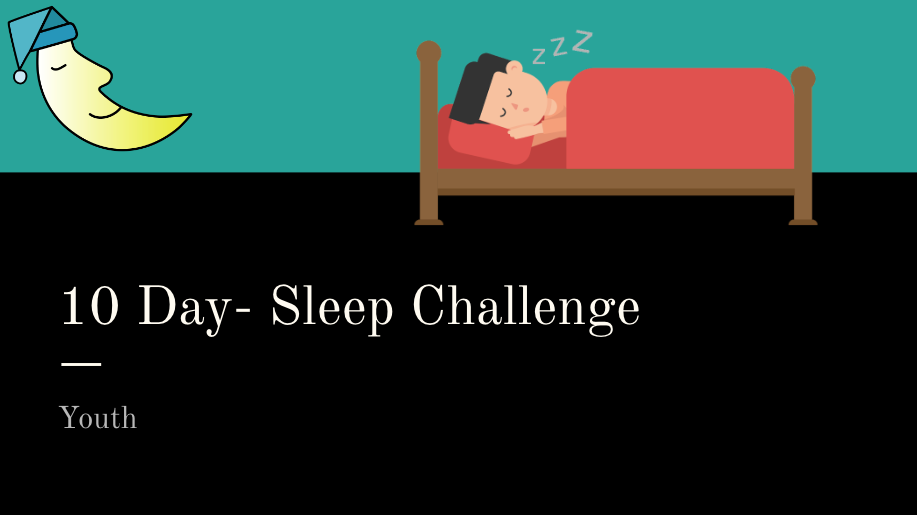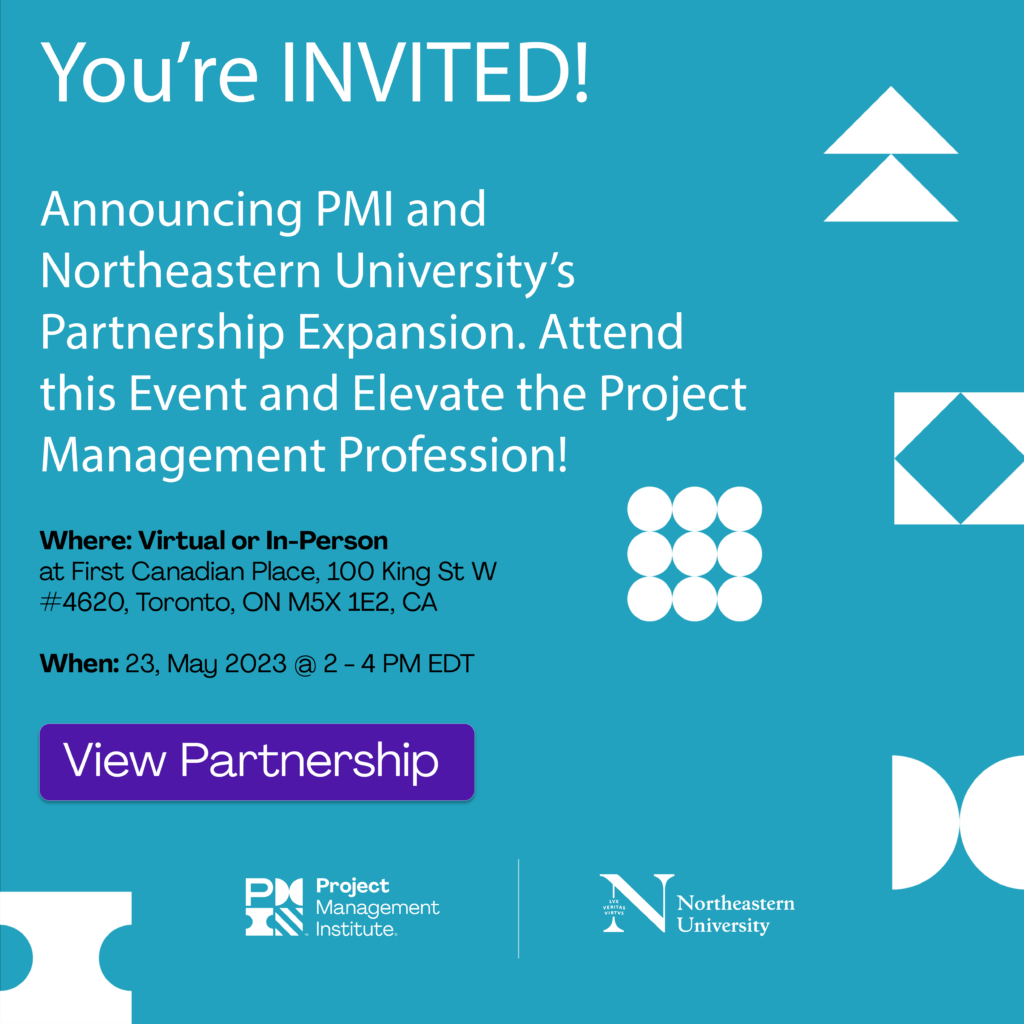Discover Northeastern EdD
Join us for the unique opportunity to hear from our education faculty who teach in our global campus network. We’ll discuss the program curriculum, balancing work and school, developing a problem of practice, and more.
Find more online events: Here
Our Sleep Deprivation Epidemic
How one researcher is fighting to change our relationship with sleep
It was in 2017 when Kathleen Mackenzie started to notice a marked shift in how children and adolescents were showing up at school.
A senior lecturer at Northeastern University’s College of Professional Studies and an award-winning clinical social worker and coordinator of clinical and behavioral services in the New Bedford school district, Mackenzie has 33 years of experience working across all age ranges of youth.
While childhood and adolescence have always been complex years of development, there was a tipping point in 2017 where kids seemed to show up more cranky and less resilient to stressors.

But why?
Initially, Mackenzie suspected the fast-paced influx of technology into all spaces might be to blame. As more kids were on screens more hours of the day, it seemed logical that there must be some correlation between the nearly omnipresent digital world and the repercussions of challenging emotional stress in the real world. While this is true, upon further study, Mackenzie found that while technology certainly had a role to play in the breakdown of social, and emotional resilience in youth it wasn’t the root cause. The root cause was much more simple. And much more alarming.
Sleep. (Or lack thereof).
Following extensive research and study, Mackenzie found that 60% of elementary students, 97% of middle school students, and 92% of high school students are sleep-deprived. Even more concerning is that overall, 60% of youth and adults sleep 6 hours or less per night, which meets the criteria for being clinically significantly sleep-deprived.
“Sleep is essential, Sleep is supposed to happen in a certain pattern and when we miss those patterns, we lose our ability to emotionally self-regulate.”
– Kathleen Mackenzie
Advocating for Sleep
A long-time advocate of rebooting our relationship with sleep, Mackenzie’s insights into sleep deprivation amongst youth were initially published in the March 2022 issue of Psychology Today titled: Could Sleep Help End the Youth Mental Health Crisis?
More recently, she took her work into the advocacy space through an award-winning public service ad (PSA) campaign in the New Bedford public access network. That awareness campaign shed light on the impacts of sleep deprivation with tools to help reclaim necessary sleep.
Mackenzie then used the PSA series, which includes a total of 11 educational videos to conduct a 10-day research study and “Sleep Challenge” with elementary, middle, and high school students in the district. Each participant was required to take an anonymous pre-survey to benchmark their current sleep patterns followed by watching the main 3.5-minute video (linked below): “Sleep On It”.
Over the next 10 days, participants were asked to answer a “question of the day” related to their previous night’s sleep, watch one of the ten science-based videos about various sleep hygiene strategies (approximately 1 minute each), and record their sleep on a Google form. At the end of the survey, participants then took an anonymous post-challenge survey.
The surveys were made available in English, Spanish, Portuguese, and K’iche.
And the results were astounding.
The Power of Sleep
Over the course of the Sleep Challenge, as kids of different age groups were given tools to help them improve their quality of sleep, students who were able to adapt these tools and strategies into their sleep cycle demonstrated significant benefits. The students who tried their hardest to change their sleep patterns reported the highest level of benefits. Data from a program for students with social-emotional challenges generated even more impressive results. In fact, within only the first few days of the Sleep Challenge, behavioral outbursts in this program were reduced from multiple times per day to zero.
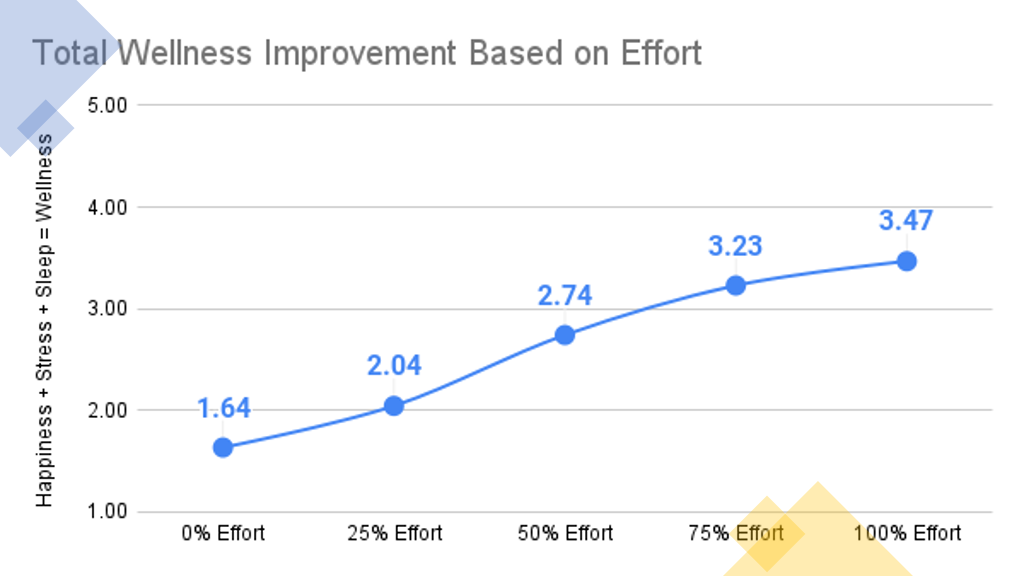
Much of Mackenzie’s foundational research work cites Mathew Walker’s seminal book, Why We Sleep. A renowned neuroscientist, Walker details the latest scientific findings on sleep and its impact on our mental and physical health as well as our overall well-being and capacity for essential daily functions.
“The best bridge between despair and hope is a good’s night sleep.”
– Mathew Walker
The quality of our sleep depends on two main types of sleep: REM and non-REM sleep. REM sleep is important because it helps us recalibrate and fine-tune the emotional circuits of the brain. This is also where dreams happen. Non-REM sleep allows us to experience a sensory “blackout” providing our brain the capacity to transfer short-term data and experiences into long-term memory.
When we don’t get the recommended amount of quality sleep (7-9 hours for adults, 9-11 hours for school-aged youth), we lose out on one or both of these cycles. This causes harm to our mood, our memory, and our bodily functions.
The lack of sleep doesn’t just affect youth. Despite the need for sleep, 50% of people under 30 sleep six hours or less. And while more sleep is gained as we get older, every age group suffers some form of sleep deprivation. Further, in addition to the day-to-day negative impacts sleep deprivation clearly has on our mood, emotion, and ability to respond to stress, over time prolonged lack of sleep can even lead to cancer, heart disease, as well as issues with immune and reproductive systems. In short, sleep deprivation kills.
“There is absolutely nothing better you can do to improve your health more than improving your sleep quality.”
– Mathew Walker
The tools to correct this epidemic of sleep deprivation are simple, yet difficult to maintain with regularity. These include:
- Develop a schedule. Aim to have the same bedtime and wake-up time every day. (Even on the weekends).
- No screens! TVs, computers, and cell phones make it harder to go to bed on time. And the light is disruptive. At least an hour before bed, we should turn off these devices.
- Time your meals. Stop eating at least three hours before bedtime to give your body time to adjust and prepare for sleep.
- Exercise daily. And early. If you work out too close to bedtime, you will have a harder time sleeping.
- Avoid long naps. A short power nap may be beneficial, but anything longer than 30-45 minutes will mess with your circadian rhythm.
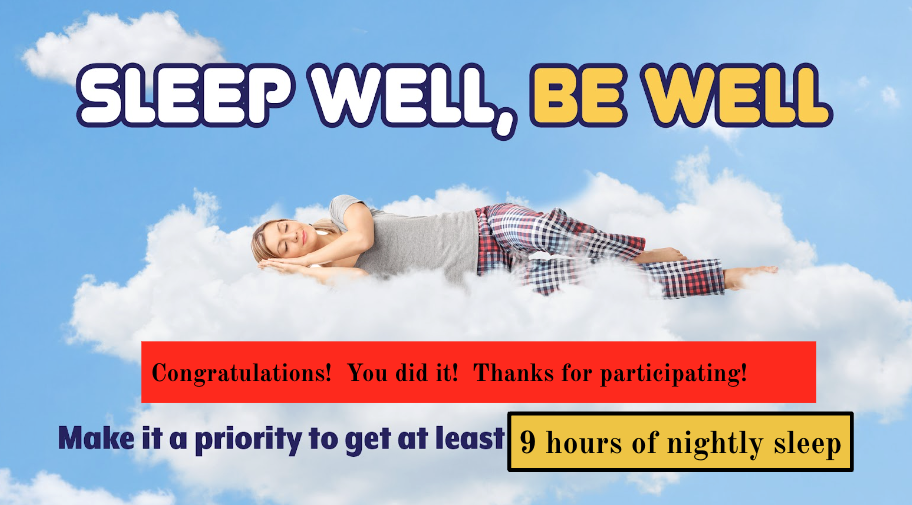
Because many of us have developed deeply entrenched poor sleep habits, these simple fixes are harder to make part of our routine. Consistency, according to Mackenzie, is key to long-term healthy sleep. Even a few days of good sleep has a measurable impact on our ability to function and engage with the world around us and all the uncertainty it presents.
So, while technology may add to our bad sleep habits, distracting us from embracing some of these simple habits, the root cause of so many of our mental and physical health issues can be traced to a simple lack of sleep. And the kids in Mackenzie’s study were keenly aware of the distraction their devices caused. Many of them cited that the #1 way their parents could help them get a good night’s sleep would be to physically remove their devices from their rooms at night. So many parents are unaware of just how sleep-deprived their children are, according to Mackenzie, that they may not know that while it may be hard to enforce, it is ultimately what most kids know they need.
When we consider that sleep deprivation may be the single largest health epidemic of our time, the earlier in life we can learn proper sleeping habits, the better. All the more so this health crisis is seldom discussed on a national scale with the seriousness it deserves. But Mackenzie aims to change that.
“It’s time to take back control of our sleep, it’s time we as a nation put significant effort and resources into fixing our sleep problem. So many lives depend on it.”
– Kathleen Mackenzie
More information about Kathleen Mackenzie is available at Northeastern University’s website and more information about her recently awarded New Bedford Award PSA based on her Sleep Challenge study can be found at WBSM.
A “College of Access”
“What we are essentially doing is incorporating a value for lifelong learning,” explains Erin Clair, Associate Dean of Undergraduate Programs. “This is a story of empowerment, because not all students are going to have a linear path and access to opportunity.”
Northeastern University’s College of Professional Studies (CPS) helps nontraditional learners achieve higher levels of education that open professional doors. This work is deeply rooted in the University’s founding principles of urban engagement and experiential learning and is set to have a ripple effect for individual communities and national workforce development goals.
“This is the ‘access mission of CPS’. Our purpose is clear, regardless of the jargon: we are creating access however we can. It’s a Robinhood-type story, its mission driven, and it’s why I’m here,”
– Erin Clair
CPS Executive Director of Marketing and Communications, Joe Brock, said, “Dating back to the founding of CPS’ (formerly known as University College), we have provided opportunities for working adults to complete their bachelor’s degree, meeting them where they are with educational excellence, and flexibility to enable their educational goals. This hasn’t changed over the years as we continue to expand and grow our partnerships with community colleges and organizations that focus on access for underrepresented communities.”
The college has amassed over 40 partnerships with community colleges across the country. Most are articulation agreements, which maximize credit transfer into Northeastern University and count towards a higher degree. But some of the partnerships exemplify more resourced options, include Middlesex Community College, Roxbury Community College, and Miami Dade Community College, where each comes with either public grants or philanthropic sources for scholarship and provides additional resources for students. This, coupled with the University’s unique placement as the number one University in coop experience [as listed by US News], becomes a compelling offering.
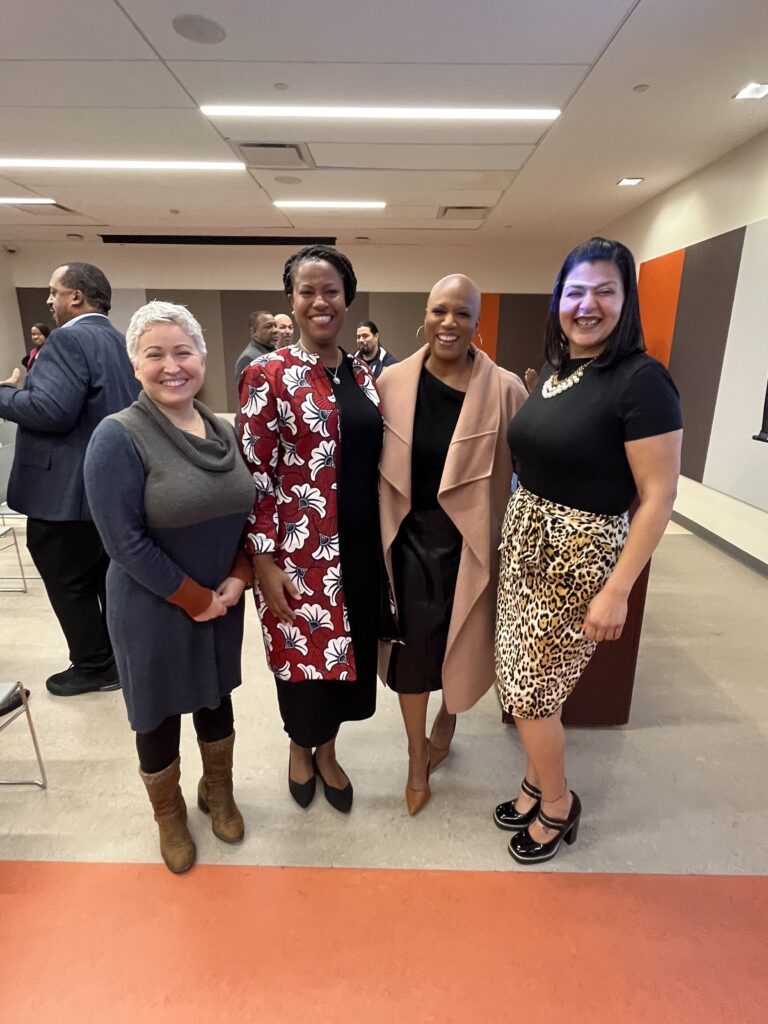
Clair’s team is responsible for the entire program that creates these partnerships, which began in 2017 when Liz Zuilick, formerly CPS Associate Dean of Undergraduate Programs and now Vice Chancellor of Strategic Planning & Projects, spearheaded a partnership between CPS and Middlesex Community College (MCC). The partnership, which is currently in its fifth and final year, received a $4.4 million-dollar grant from the National Science Foundation (NSF) to award scholarships to low-income and under-represented minority students in biotechnology who participate in an accelerated Associates to Masters’ Degree Program, known as “A2M.”
As an example of impact, in 2021-2022, the partnership with MCC served 40 students at the Associate’s level, 48 at the Bachelor’s level, and 14 at the Master’s level, with 92 distinct students. A total of 34 students graduated from one of these degree programs within the calendar year.
In 2020, Northeastern University’s President Joseph E. Aoun established the ‘Experience Unleashed’ strategic vision, which committed the University to a mission of equitable access across its global campus network. Part of this effort, known as the ‘Impact Engine’ initiative, formally adopted the A2M bachelor’s completion program as an approach to meeting its goal of ‘making the world a better, more equitable place through access to higher education’.
The University is currently working on replicating the approach at a faster pace throughout its global campus network, focusing on partnering with community colleges that are located in proximity to Northeastern campus locations. The hope is that many of these partnerships will grow to attract additional resources that will benefit students.
As testament to the college’s agility in making higher education accessible beyond barriers, the approach has taken many forms – A2M, eA2M, PlusOnes, and Pathways are all common names associated with it. The overarching focus is the same: to provide a “bachelor, and beyond, completion initiative” aimed to equip learners with whatever it takes to provide them with professional opportunities, while simultaneously removing barriers to higher education.
Who’s Behind the Effort
“Through the eA2M Model, we plan to reach learners in the regions surrounding our global campus sites. In addition to experiential opportunities, we offer funding support, support with childcare, and 1:1 student coaching that will help students navigate the complexities of college learning!” said Chris Cook, Director of Impact Engine, Professional Programs, who works to grow partnerships through what is referred to as the Experiential Associates to Masters (eA2M) model.
“We strategically align our programming to be in fields where there is high demand and pathways to economic viability. We know there is significant underrepresentation in high skill, high paying jobs, we intend to support incredible learners to develop those skills and access those jobs! This objective is tied to national workforce development and that approach is championed by Northeastern.”
– Chris Cook
Oftentimes, the students who are taking advantage of these partnerships are first generation college students, the first ones in their family to attend college or university.
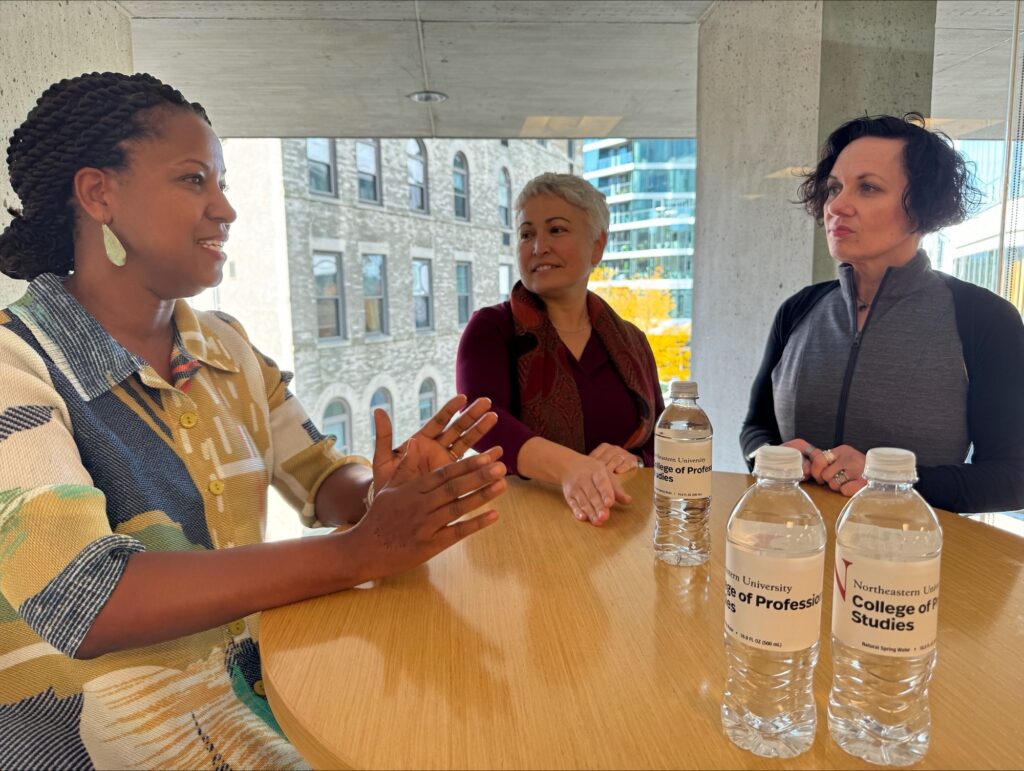
“When you are the first person in your family to pursue a college degree, you do not necessarily have access to information on how to best navigate a complex college system.”
– Earlene Avalon, Associate Teaching Professor and Director of the Lowell Institute School, who recently helped launch CPS’s newest Bachelor completion partnership with Roxbury Community College.
The partnership is supported by the $1M Federal grant awarded to the application that Avalon co-wrote with Francesca Grippa, Professor and Associate Dean of Research for CPS Undergraduate Programs. The provides 30-50 students scholarship opportunities in STEM related fields of healthcare, technology and biotech.
Avalon is herself a first-generation college grad who understands the barriers faced. “This can be a huge barrier, coupled with the fact that some students have to work full-time or are raising a family, all while pursuing their degree.” she said.
Each enriched partnership aims to be tailored to the socio demographic needs of the student body. In the case of Miami Dade Community College, the partnership aims to provide childcare to accommodate the need voiced by the prospective student body, many of whom are young mothers trying to gain professional opportunities through higher education. Wherever possible, the partnerships are funded by a third party like a state or federal grant that supports workforce development.
“This work is about building a pathway to prosperity not just for students, but also prosperity for the country because of this talented workforce that we know nothing about,” said Deb Jencunas, one of many CPS change agents at the helm of forging these community partnerships. As Director of Pathway Partnerships, Jencunas primarily works to build partnerships that support bachelor completion programs.
“Because they lack access to finance, they haven’t had the opportunity to develop professionally beyond high school or have greatly struggled to do so. What would our world look like if access wasn’t a challenge? That’s why I do this.”
– Deb Jencunas
When asked why Northeastern University is so attractive to learners, Jencunas explains that CPS’s direct connection to industries and professional fields offer students an immediate benefit of a network.
Northeastern’s Alumni network is also actively supporting this model. CPS Director of Development Tara Esfahanian says, “Many of our donors are alumni, themselves once in the position of being first generation college graduates that were helped by this approach. They are usually eager and excited to give back in the same way they were given to.”
The Navigator
One of the most unique aspects of the funded partnership model is in the form of direct support from student academic support coaches called ‘CPS Navigators’, whose role is to walk each student through the process of onboarding into a program at Northeastern University.
Mary McCarthy, CPS Director of Strategic Partnership of Funds, seeks to activate philanthropic support from a variety of sources including federal monies, community college partnerships, corporate and foundations sponsorships, and the tremendous generosity of alumni and friends, to enable students to enter and excel in higher education.
“That support can come in many forms including endowed or current-use scholarship awards, in addition to wrap-around services that provide students with textbooks, laptops, and personnel support in the form of the Navigator role. A Navigator is a CPS employee whose responsibility is to partner with students to help them navigate the unique complexities of higher ed administration. CPS is pleased to have spearheaded this model for success, wherein A2M students have a steadfast ally in navigating the various hurdles of admissions, enrollment, matriculation, and degree completion. In different cities, student experience unique region-specific needs. The Navigator can be particularly useful in diagnosing the nuanced needs of a given region, allowing us to successfully clear those unique hurdles. While I have only been at Northeastern a short time, in my 26 years in Higher Education I have never witnessed a more robust and generous student support infrastructure.”
– Mary McCarthy
Tahir Abbas is the Navigator for the MCC A2M Program Biotech who facilitates student transitions from Middlesex Community College into Northeastern University. His office is located within MCC and students can drop by to visit him.
Visibility is really important, by having this office and being located at the community college, we are demonstrating how committed and accessible the program really is.”
– Tahir Abbas
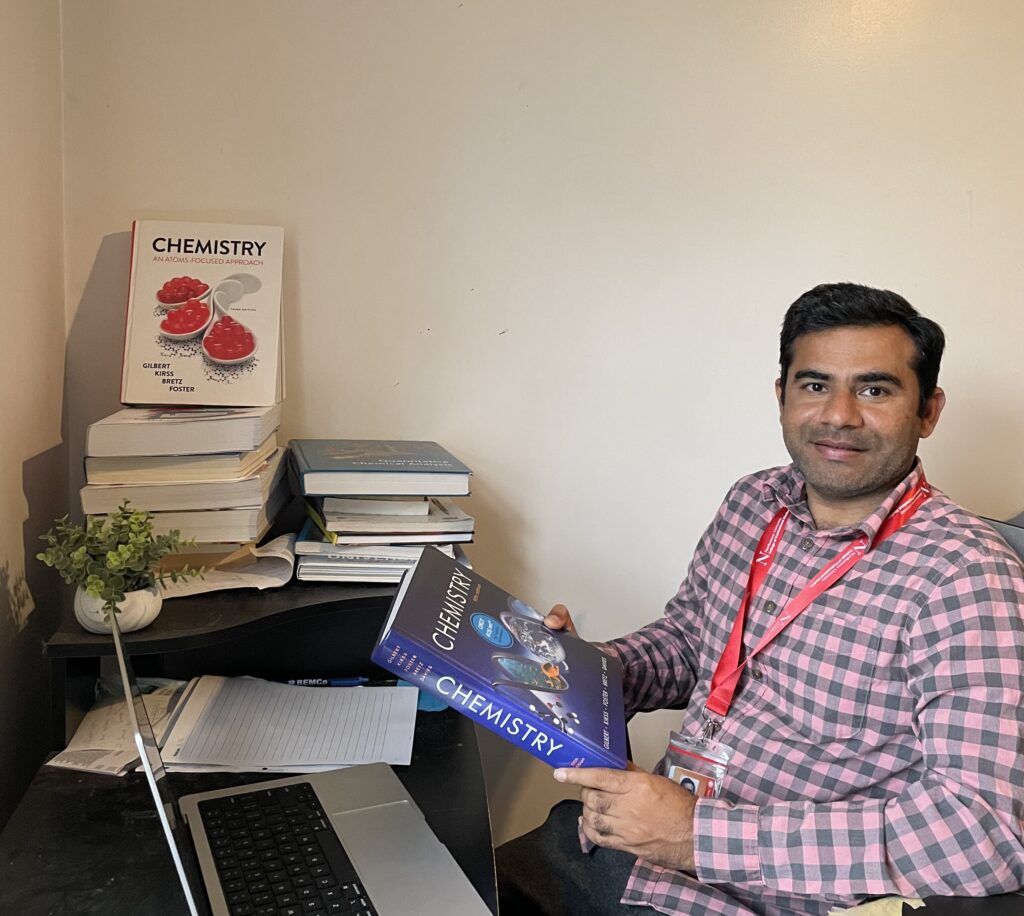
Abbas helps at every stage of the process, from the application process all the way to placing them in a job internship and anything else in between, including aligning the student with financial assistance, helping with funding tuition, textbooks, or parking passes. Tahir also helps students determine their eligibility for financial support. For example, the MCC Tech program provides students with $5k per semester with a maximum cap of $10k per year. The typical out-of-pocket cost to students is $2-3k per semester. Sometimes, Tahir will work to find alternative funding sources to cover even that.
The navigator role is a major factor in the success of the whole approach. The value lies in specialized attention tailored to the needs of each student.
“If a student comes to me, I never send them away. Universities have complex financial aid and enrollment systems, but if students come to me, I help them figure that out. Once they trust me, they begin to believe they can accomplish bigger goals with this sort of support behind them.”
– Tahir Abbas
Abbas related that the hardest part of the job can be quite labor intensive: delivering textbooks. “Sometimes our students are single parents, or pregnant, so I deliver to the house. And I don’t mind because it helps, and I like that.” Abbas continues, “The students are supposed to return those books at the end of the semester. In December, I will drive again to collect them!”
It’s all in a day’s work for the CPS team that is helping students achieve goals they never knew were possible.
Snell Library Tour for CPS Students
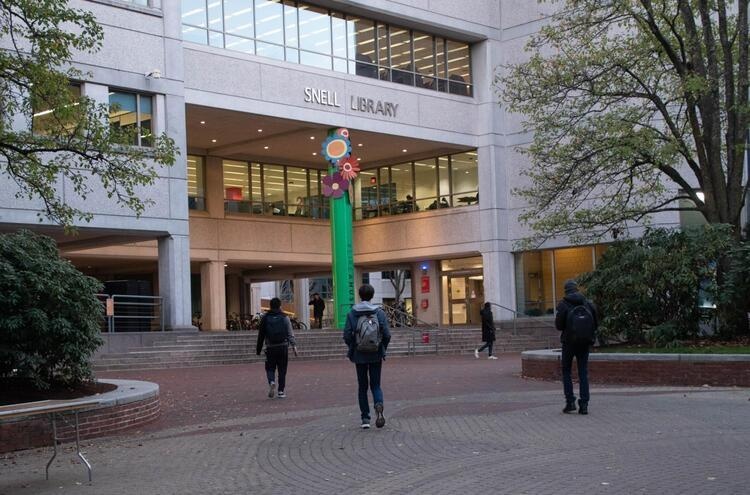
Meet CPS Librarian Anaya Jones outside Snell’s temporary entrance on the west side of the building for an up-close and personal tour of the library! Please complete this registration form so we know you’re coming. Thank you!
The Student Perspective: The shock and confusion that comes with being new to America
Oishika Hota, MS Media Innovation and Data Communication, class of 2024 Graduate, talks about her experience as an International student
One of the great privileges I have been offered is that of exposure. Starting from school all the way to graduate school here at Northeastern, every step I have taken has expanded my world significantly. But nothing has done the job like moving my life halfway across the globe.
Coming from Mumbai, Maharashtra, the most populous city in India, a land known for its vast array of cultures, languages, and traditions, I thought I had seen it all. However, the U.S. presented an even more intricate mosaic of backgrounds, beliefs, and practices. In India, a fusion of varied traditions and customs maintains its quintessential Indian identity despite the diversity. On the other hand, the US displays an intricate mosaic, presenting influences from diverse corners of the globe, resulting in a distinctive cultural mix. I feel like I am part of a melting pot, and navigating this diverse tapestry is one of my favorite challenges as an International Student in America.
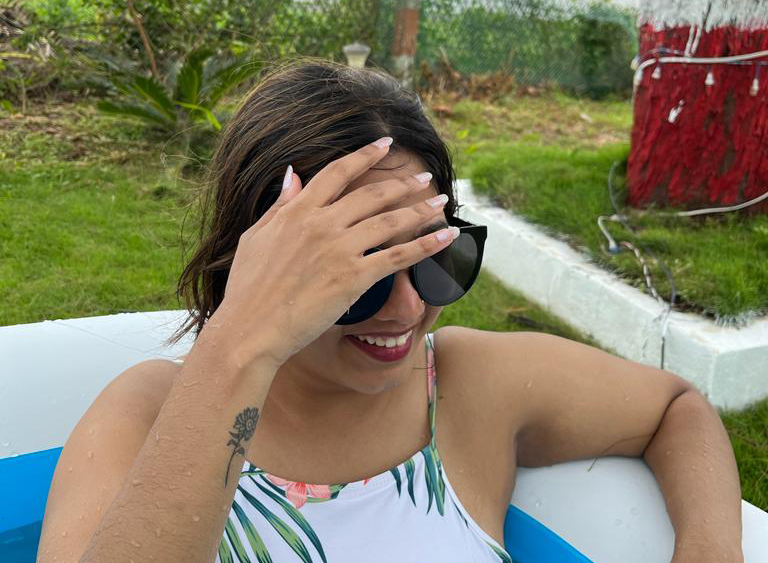
“There is a difference between knowing something and actually experiencing it.”
Oishika Hota
Whatever I knew about the U.S. before landing here was from my consumption of American pop culture. As a fan of chick flicks, Legally Blonde and Pitch Perfect shaped the way I perceived the American Collegiate experience. Apart from that, I had also watched enough TV shows and movies to anticipate a lot of what was thrown at me: the small talk, the food, and the cold weather. When Mindy Kaling made New York winters seem warm compared to Boston in “The Mindy Project,” I knew I had to be prepared. But there is a difference between knowing something and actually experiencing it.
For all the small talk America offers, I had a lot of trouble making friends — especially as a graduate school student, where forming a community in a class full of people from several countries is, to put it simply, hard. Overcoming these challenges required me to step out of my comfort zone. I began attending social events organized by the university and joining clubs related to my interests. It was nerve-wracking at first, but I pushed myself to strike up conversations, even if it meant starting with a simple “hello.”
I’m not a hater of American food, but there are a few dishes that just don’t hit the mark for me. Especially when they’re missing that spicy, flavor-packed kick that Indian dishes usually bring to the table!
While ingredients and restaurants can be found in Boston, the cost of materials and lack of variety ends up killing the taste. Even though I have learned how to cook, nothing beats the taste of food cooked in your actual home.
The cold, again, was something I was mentally prepared for, but coming from a tropical country, acclimatization did not come easy. I could finish bottles of moisturizers, but I did not understand why my skin was still dry, why I was still feeling cold after wearing my thickest jacket, which brand would protect me the best, and why it was so dark at 4:30 p.m. Despite the struggle, I found ways to keep pushing through. You find little moments of joy, like a warm cup of hot chocolate, a cozy night in with your favorite food and a movie.
With practice, my problems have changed. I feel better prepared for my second winter here, I am ready for the lull and sadness that comes with the darkness. It’s about acknowledging that this period is difficult, allowing yourself to feel it, and seeking support when needed. Whether it’s talking to a friend or a professional, sharing the burden of these winter blues can make a world of difference.
But at the end of all this, the hardest shock hasn’t been cultural, but that of the magnitude of my homesickness. Being far away from the close-knit family and the familiar comfort of home is a struggle. Learning to adapt to a new culture is by far not an easy task. The difficulty is what has sparked resilience in me and pushed me to explore this new landscape; to develop a new support system despite the cultural and the often not-so-edible reminders that I am in a country that is not mine.
“Whether it’s talking to a friend or a professional, sharing the burden of these winter blues can make a world of difference.”
Oishika Hota

Moving away from home has been the hardest thing I’ve ever done. But it has also been one of the most enriching experiences of my life. It was a slow but rewarding process. As I opened up and made an effort to bridge the cultural gaps, the move didn’t seem so bad.
Looking back at the whirlwind of the last year, I’m giving myself a mental high-five. The hurdles and bumps were tough, but they’ve turned me into a stronger and wiser version of myself. And for that, I am immensely grateful.
Annual Scholarship Reception a Huge Success!
With over 225 students receiving upwards of $300,000 from 52 scholarships – there was much to celebrate at the College of Professional Studies’ annual Undergraduate Scholarship Reception.
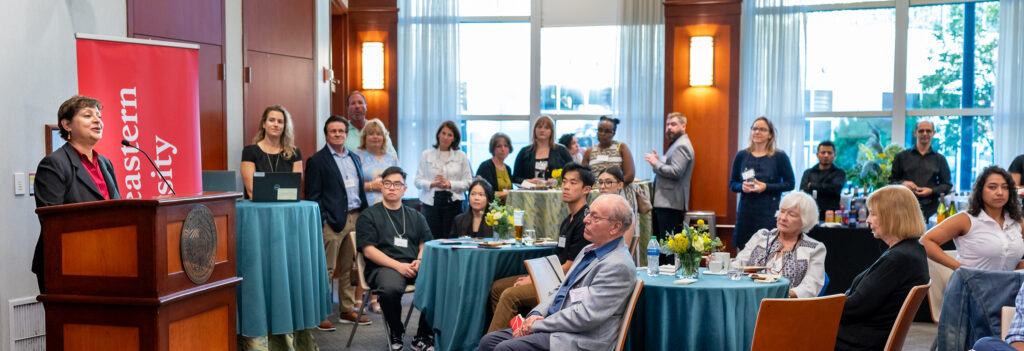
With the crackling anticipation of alumni donors eager to meet the recipients of their scholarship funds – and students so excited to greet and thank their benefactors all in attendance, the gathering has all the earmarks of a supportive community rooted in a legacy of achievement and of people helping people reach new heights.
The celebration included inspiring remarks from two benefactors, Mani Sundaram, MS’99 and Meena Ramakrishnan, CPS’06 who each offered compelling reflections on their experience supporting financial aid:
“Sponsoring six CPS students has been a source of immense gratification for us. We love the concept of creating a pathway for students and community colleges to gain the knowledge, skills, and credentials to align themselves with what’s going on in the industry, secure excellent jobs and build strong career trajectories.”
Mani Sundaram. MS’99
“We felt it was the right opportunity to do our part because we had been given challenges back then so both of us are delighted to be part of this program and we wish all the students here all the very best in your lives.”
Meena Ramakrishnan CPS’06
Mohamed Abougalala, Information Technology, Class of 2024 rounded out the program with a personal account of his journey to CPS from Egypt. Mohamed shared his experience arriving at CPS, saying, “The moment I stepped onto campus, I felt a sense of belonging.”
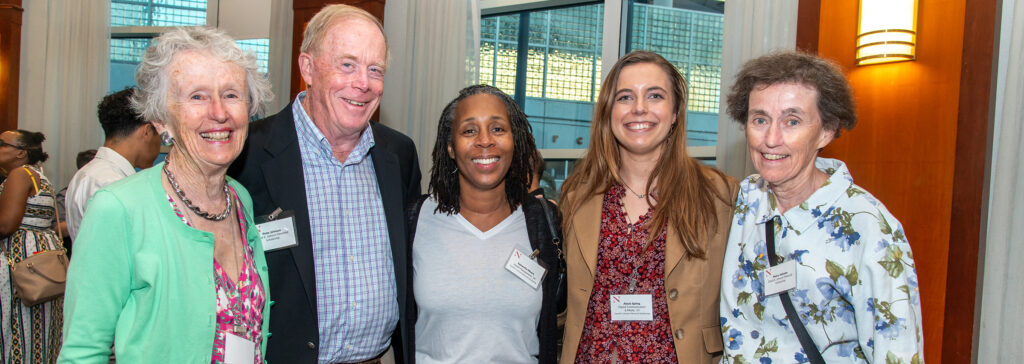
Whether a student, alumnus, donor benefactor, staff member, academic advisor, or faculty member – the annual Scholarship Reception fills the tank on good vibes with warmth and an expansive sense of the goodness and remarkable capacity of the College of Professional Studies to positively impact lives, to advance opportunity, and to building a community rooted in a culture of giving back.
If you have any questions about the undergraduate scholarship program at the College of Professional Studies, please contact Mary McCarthy, Director of Strategic Partnerships and Funds, at [email protected].
View photos from the event here.
(HOS) Navigating Change: Transitioning to NEU
Join the Habits of Success (HOS) program under the Student Support Initiative as we begin our HOS Summer series! This workshop, Navigating Change: Transitioning to NEU, offers valuable tips for transitioning from high school and summer break to the new school year at Northeastern. Come to ask questions, make connections, or listen – we are excited to meet you!


(HOS) Introduction to Boston: Student Perspective
Join the Habits of Success (HOS) program under the Student Support Initiative as we begin our HOS Summer series! This workshop, Introduction to Boston: Student Perspective, provides helpful tips on commuting, NUID usage, museum discounts, and ways to explore the city. Come to ask questions, make connections, or listen – we are excited to meet you!
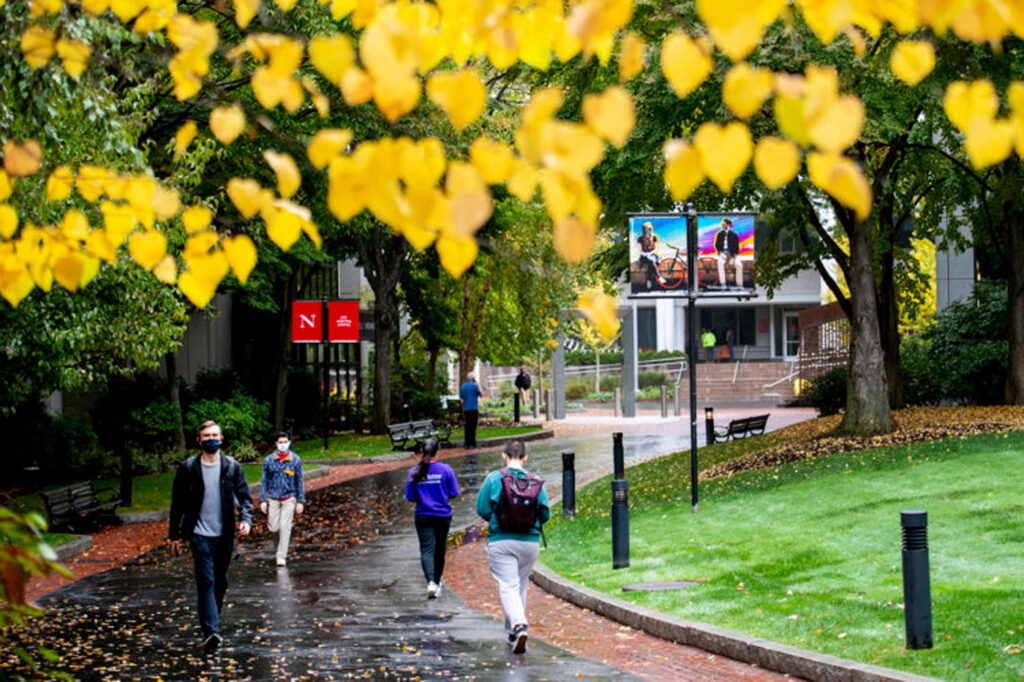

“I wanted the women to tell their stories” – Tracy Threatt
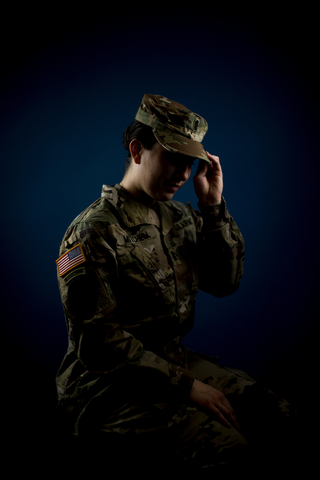
Northeastern graduate making female veterans feel less ‘invisible’ with help from the George W. Bush Presidential Center
CPS Alumn, Tracy Threatt, helps female veterans feel less ‘invisible’. She was recently named as a scholar in the Stand-To Veteran Leadership Program at the George W. Bush Presidential Center in Dallas, and she embodies the college’s ethos of bringing opportunity to those she meets.
PMI and Northeastern University Launch New Partnership, More Opportunity and Value for Project Management Learners
Northeastern University’s College of Professional Studies (CPS) is pleased to announce an exciting new offering from its existing partner, Project Management Institute (PMI). PMI is offering a 30% discount on either the Project Management Professional (PMP) or the Certified Associate in Project Management (CAPM) certification, as well as a discounted student membership to the organization and connection with local PMI chapters. These discounts are available to all Northeastern students interested in leveraging these valuable certifications to further their careers in project management.
An in-person kickoff event to celebrate the enhanced partnership is scheduled for Tuesday, May 23, from 2 to 4 p.m. and will take place on the Northeastern Toronto campus. Virtual attendance at the event is open to all Northeastern students throughout its global campus network. Registration can be accessed here.
The Northeastern CPS Master of Science in Project Management Program is accredited by the PMI Global Accreditation Center for Project Management Education Programs (GAC). In October of 2021, the Master of Science in Project Management accreditation was re-affirmed for the maximum five-year accreditation cycle (originally accredited in 2009) by the PMI Global Accreditation Center for Project Management Education Programs (GAC), the world’s leading association for Project management professionals. Accreditation is achieved by meeting the GAC’s rigorous standards, which include an assessment of program objectives and outcomes, a review of onsite and online resources, evaluations of faculty and students, and proof of continuous improvements in the area of project management.
Adel Zadeh, Associate Teaching Professor of Project Management, says, “As CPS continues to focus on student success, this partnership brings tremendous value to our students and program and extends their impact across our global network. By aligning with PMI Global, students gain invaluable access to PMI’s vast resources, including cutting-edge methodologies, best practices, and a global community of professionals. This partnership bolsters their academic experience and equips them with the practical knowledge and credentials required to excel in real-world project management scenarios while standing out in a highly competitive job market.”
About PMI
Project Management Institute (PMI) is the leading professional association for project management and the authority for a growing global community of millions of project professionals and individuals who use project management skills. Collectively, these professionals and “changemakers” consistently create better outcomes for businesses, communities, and society worldwide.
What is PMP & CAPM Certification?
PMI created Project Management Professional (PMP) Certification to recognize project managers who have proven they have the skills to successfully manage projects. Project Management Professional (PMP) certification represents an elite group of project managers that are valued and recognized by thousands of employers globally. It proves project leadership experience and expertise in any way of working, and it signals that recipients are highly skilled in people, processes, and business environment goals and objectives.
The Certified Associate in Project Management (CAPM) Certification is a globally recognized credential that opens the door to opportunities at every career stage in the field of project management. The current CAPM certification involves taking an exam that tests your aptitude in: Fundamentals of project management and the role of project managers, Project management environment and project integration management, Project scope, schedule, cost, quality, and resource management, Project procurement, communication, stakeholder and risk management. The CAPM certification is a typical first step in building a career as a project manager.
